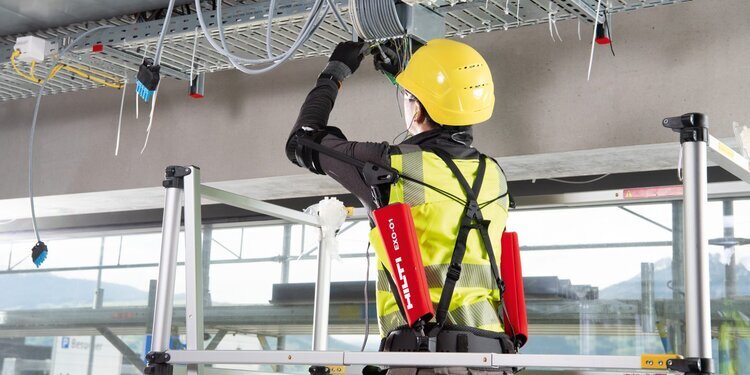The two major issues with asphalt roadways are their lifespan and their vulnerability to weather and temperature. The optimum lifespan of an asphalt road is about 25 years and that is dependent on a large variety of factors. In the Northern United States, this lifespan could substantially less, 15 to 20 years. One of the largest frustrations with our current road systems is the time it takes to build and resurface roadways. Many of the solutions proposed are costly and un-sustainable.
Spearheaded by Dutch company VolkerWessels a new innovative solution called Project Plastic Road looks to solve many of the issues that plague our current road infrastructure. Plastic Road's proposed road system will be modular and made out of entirely 100% recycled materials. The idea is to turn recycled plastic into modular prefabricated roads that can be dropped into place. VolkerWessels claims that this system could have a longevity of 3 times more than asphalt, and because the pieces are modular and interchangeable replacing a road could take a fraction of the time it takes now.
According to VolkerWessels, using Project Plastic Road opens up innovations that asphalt does not have the ability to incorporate. Roads can be fitted for power generation, quiet road surfaces, heated roads and, of course, modular replaceable road panels.
PlasticRoad is also virtually maintenance free. It is unaffected by corrosion and weather. The road structure can handle temperatures of -40F to temps as high as 176F with no negative effects.
One of the things that stands out to me about this product is the ability to have lines in the road be integral and not fade, as well as having the ability to run city infrastructure through the hollow core could really be a game changer for how city infrastructure is planned and implemented.
Last summer, Hilti announced that they had developed their first exoskeleton designed for construction tradespeople in a partnership with Ottobuck, a prosthetics, orthotics, and exoskeleton provider. Earlier this month, Hilti officially released the exoskeleton, announced more details, and published its retail price on their website.
Cat Phones is known to make some pretty rugged smartphones, the kind of phone you don’t have to worry about on the jobsite – even without a case. Licensed by the construction equipment giant, Caterpillar, the phones are made by the UK-based Bullitt Group. The company recently announced the release of their new flagship smartphone model, the CAT S62 Pro.
The construction technology world has been no stranger to acquisitions and mergers in recent years, as many larger players are gobbling up startups and other specialty software to quickly grow their offerings and expand their value to their customers. The latest acquisition comes from a somewhat surprising source, however, as Stanley Black & Decker, the power tool and storage company, has acquired Buildup, a task management, punch list, and inspection software company.
Father’s Day 2021 is June 20, so you better get started on gift ideas if you want to impress dad this year. Whether your father is contractor, handyman, or DIYer, we’ve got a lot of great ideas for him this year.
For more more gift ideas, be sure to check out our past Father's Day Gift Guides from 2016, 2017, 2018, and 2019 or our Ultimate Construction Holiday Gift Guides from 2015, 2016, 2017, 2018, 2019, and 2020
Procore, the construction management software company, has been rumored to be interested in filing for an IPO since at least 2019. In the Spring of 2020, Procore ended up delaying its plans to go public after it received $150million in funding and a valuation of around $5 million, citing interest in raising more money amidst an uncertain economy during the heart of the coronavirus pandemic.
It’s that time again to begin Construction Junkie’s annual search for the best construction podcast! Now in our 7th year of the competition, we’re noticing a considerable increase in construction-related podcasts from every sector.
While still new in the construction industries, robots are typically designed to perform a specific task in a highly precise and efficient way, like the rebar tying robot, Tybot or the brick-laying robot Hadrian X. More recently, though, robots are being imagined as platforms for 3rd party companies to develop hardware and accessories to attach to the base robot, like the Boston Dynamics robotic dog, Spot. I recently came across a new robot, called Baubot, which hopes to one day perform tasks using every tool on a typical jobsite.
Autodesk announced the impending release of 3 new products, combining the best of all of their existing products and adding new features, at last year’s virtual Autodesk University. Those products (Build, Takeoff, and BIM Collaborate) are now fully available on a global scale, with Takeoff being the most recent release.
Last summer, we learned that Travelers Insurance believed that using Procore as a project management tool helped contractors reduce risk on their projects so much that they were willing to help pay for them to join the platform. That deal was previously limited to customers in 10 US states, but Travelers and Procore have collaborated to further expand that program.










In the midst of fierce discourse over the bipartisan infrastructure bill lies a unique opportunity for the United States.